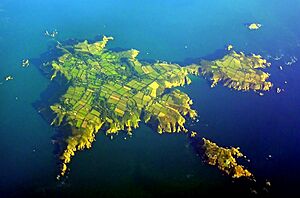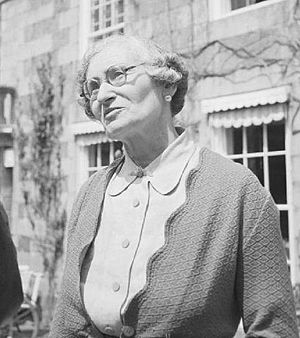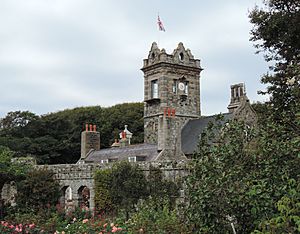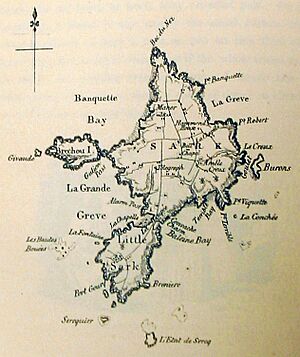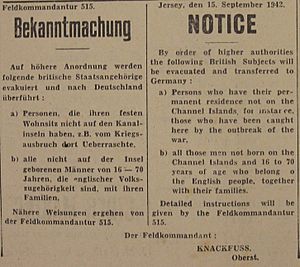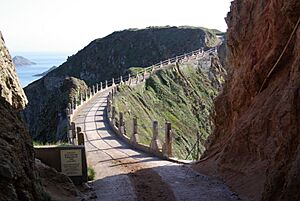Sark during the German occupation of the Channel Islands facts for kids
The island of Sark is part of the Bailiwick of Guernsey, which, along with the Bailiwick of Jersey, makes up the Channel Islands. When World War II began, many islanders were given the chance to leave Sark in June 1940. However, most people who were born on the island chose to stay. About 470 civilians remained under German rule for five years until Sark was set free on May 10, 1945. The main person who talked with the German authorities was 56-year-old Sibyl Hathaway, the Dame of Sark. She was the island's feudal lord from 1927 until she passed away in 1974.
Contents
Sark During Early World War II
Britain declared war on Germany on September 3, 1939. After this, some islanders left Sark to join the armed forces in England. A total of 27 people from Sark joined the military, and one of them sadly died before the war ended.
Sark was somewhat ready for what might come. An elderly man named John Perrio, who was 70, would ride his donkey "Clarabelle" around Brecqhou every day. He was armed with a rifle and wore a kilt and gumboots. There was also a small amount of gunpowder for an old cannon on the cliff top.
In May 1940, as France was about to be taken over by Germany, the British Government suggested that everyone who wanted to should leave the island.
Sibyl Hathaway, the Dame of Sark, told a public meeting that she and her husband, Robert Hathaway, would stay. She believed the Germans wouldn't bother Sark much, or if they did, they wouldn't stay long. She also said the island had enough food, so there was no need to leave. This convinced many people, especially those born on Sark, to stay. Some people born in England did leave, using ferries or private boats. The island's only doctor was among those who left.
On June 28, Guernsey and Jersey were bombed by German planes. These planes flew low over Sark and even shot at Sark fishing boats. German troops landed in Guernsey and Jersey a few days later without any fighting because the islands had been declared "open towns," meaning they would not be defended.
German Occupation Begins
On July 3, a lifeboat from Guernsey arrived in Sark carrying three German officers. Major Doctor Albrecht Lanz, the commander of Guernsey, came with Major Maass, who spoke English. They were told there were no carriages, so they had to walk up a 300-foot hill to La Seigneurie, Sibyl Hathaway's home. She received them there.
Sibyl Hathaway was very good at handling the old-fashioned German officers. Throughout the war, she managed to control meetings, expecting the officers to bow and kiss her hand. This was a big help for the islanders. Sibyl Hathaway had lived in Germany and spoke German well, which allowed her to talk clearly with them. Also on the lifeboat were 10 German soldiers who set up their base and a flag at the Hotel Bel Air.
One of Sibyl Hathaway's first successes was getting the Germans to agree to have a German doctor based in Sark. This doctor would treat both the local people and the soldiers on the island.
On July 8, 1940, a British Commando raid called Operation Ambassador was supposed to land troops in Guernsey. However, one group of soldiers landed on the wrong island, Sark, because of a faulty compass. They landed on Little Sark, explored a bit, and finding no Germans, returned safely to their ship.
Daily Life Under Occupation
The German rules and regulations applied to Sark, just like the other islands. These included blackouts at night, curfews, and rules about fishing. However, rules about cars didn't apply because Sark didn't have any motor vehicles.
Fishing was very important in Sark. Fishermen were allowed to fish within 3 miles of the coast. Two boats were allowed to go to Guernsey to sell their fish and bring back fuel for their boats. Once a week, these boats would also deliver supplies to Herm and Jethou.
The Germans were quite relaxed in Sark at first. Many Sark people treated the small number of German soldiers more like tourists. Soldiers were sometimes invited to dinner, and everyone met at the Mermaid Tavern. The Guernsey cricket team even came to Sark for a match in 1940. The Sark Sports games happened as usual. The Germans behaved very properly during this time.
A ship called the SS Staffa sailed from Guernsey to Sark three times a week, bringing important supplies like paraffin, coal, and flour. Later, other ships took its place.
Sark, like all occupied places, had to pay for the occupation. This was hard because Sark didn't have direct taxes on people or businesses. Meanwhile, the number of German soldiers on the island was growing.
In November 1940, 180 radios were taken away. This didn't affect Sark as much as other places because not many people had radios. Many civilians spoke their local language, Sercquiais, rather than English, and weren't very interested in listening to the BBC. Still, a few radios were hidden, and crystal sets were kept. The radios were returned on December 14.
Christmas Eve was celebrated together by both islanders and Germans, with decorations, music, and carols. On New Year's Eve, the Germans joined in singing "Auld Lang Syne" at midnight before firing their weapons to welcome the new year.
Continuing German Occupation
Life in 1941
German soldiers were regularly moved around, and more soldiers arrived, bringing the total to 200. With them came a group of officials who gave out many strict and sometimes illogical orders. For example, they limited fishing times without considering the tides, which led to fewer fish being caught. Later in the year, they started listening to Sibyl Hathaway's advice before issuing orders, making rules milder in Sark than in other places.
Islanders sometimes won arguments with Germans about where to place barbed wire and machine gun positions. German soldiers were afraid that Sibyl Hathaway might complain to her "friend," the commandant Colonel Rudolf Graf von Schmettow.
The first messages from the Red Cross arrived on February 16, 1941. In July, Sibyl Hathaway received a message saying her son had been killed in a bombing raid in Liverpool.
Shortages in shops became very noticeable, and everyone focused on growing food. Islanders started to go hungry and lose weight.
The year continued with a good amount of friendly interaction. Evenings in pubs and dances with local girls created a relaxed atmosphere. The Germans would play soccer against a Sark team. Sark was still open to tourists, but now only to holidaymakers from Guernsey. Identity cards were introduced in July.
A "purchasing commission" based in France tried to get essential supplies for Sark, based on what was available and how much money they had.
German orders against Jewish people only affected one person on Sark, Annie Wranowsky, who was Czech Jewish. She became the German language teacher on Sark, avoided being sent away, and kept her job.
The Germans brought in a few motor vehicles and also horses as they started to build defenses on the island. Minefields were slowly put on beaches and cliff paths. Anyone with a horse and cart was ordered to help transport military goods. The nearby island of Brecqhou was emptied of people. Some houses were taken down or moved because they were made of wood.
Life in 1942
Visitors no longer came to Sark. The only reason a local person could visit Guernsey was for a toothache, as Sark had no dentist. People often pretended to have toothaches so they could spend a few days off the island, perhaps to visit a cinema.
German soldiers accidentally set fire to their headquarters, the Hotel Bel Air, which burned to the ground. Their headquarters then moved to Le Manoir.
Radios, like in the other islands, were taken away again, this time for the rest of the occupation.
In September, a German order was given to send all men with English parents to camps in Germany. Sibyl Hathaway understood this to mean people not born in Sark. The first list was made smaller, and in the end, only nine people were sent to Guernsey. Single men were sent to a camp in Germany, joining many other people sent away from the Channel Islands.
Another British commando raid, Operation Basalt, aimed to land on Sark. On October 3–4, 12 men arrived by boat to capture a prisoner. They landed on the east side of the island, climbed cliffs, and followed a path. After checking an empty house, they broke into another house. The lady there, Mrs. Pittard, told them about the Dixcart Hotel. There, after killing a guard, they found five sleeping German military engineers. The small group took them prisoner and tied their hands. But the prisoners started shouting and fighting. One German ran towards a nearby hotel where other soldiers were sleeping. The struggle turned into a fight, and the others were shot. Only one German was taken back to the boat, and the British escaped. Three German soldiers died. Mrs. Pittard was sent to prison in Guernsey for three months before being sent away to Germany. The Sark commander, Oberleutnant Stefan Herdt, lost his command for being too friendly and for the failure during the commando raid.
A few days after this event, Hitler gave his Commando Order. This order said that Allied commandos would be treated like criminals and killed. The Germans handcuffed 1,376 prisoners taken in the recent Dieppe Raid. In response, German prisoners in Canada were also handcuffed. About 100 commandos captured in future raids in Europe were executed.
Now that Sark was a front line in the war, Major Johann Hinkel, the new commander, had 13,107 mines laid. Access to beaches was blocked, and more troops arrived, bringing the total to about 500. Anti-aircraft guns and an anti-tank gun were put on the island.
An Avro Lancaster bomber crashed at night near La Seigneurie on November 23 because it ran out of fuel. Some of the crew had jumped out over France. Three RAF men were captured and taken to Guernsey. Unlike in the other islands, islanders in Sark would go outside to look if they heard a plane, as it seemed impossible that Sark would be bombed. Nobody had an air raid shelter or a gas mask.
Life in 1943
In February, a second group of people was sent away. Originally 60, the number was reduced to 25, including the vicar, a family with seven children, and another family with nine children and their elderly grandmother. The German commanders were not happy about these deportations, but the orders came directly from Hitler. Robert Hathaway, the Seigneur of Sark, was among those sent away. Families went to a camp in southern Germany.
The German commandant was killed in March when he stepped on a mine. Fifty minefields had been laid, including fields very close to the village. A four-year-old child was also killed when she walked into a minefield.
With fishing being the main source of food, one resident joked about having to eat lobster every day. There were 120 cattle, so milk was enough for half a pint per person per day. Farmers also grew produce on 200 acres and kept chickens and rabbits. All this food was needed for the 400 islanders and the 500 soldiers. Most meat, except for pork and rabbit, had to come from Guernsey. In September, the German soldiers on Sark were reduced by 150.
Fuel was a big problem. Coal was impossible to get, and Sark had few trees. Dried seaweed could not be collected after the commando raid closed the beaches, and collecting furze (a type of thorny bush) became impossible after the mines were laid. Germans started pulling down wooden houses for fuel. Electricity was only available in a few houses, and candles were impossible to get. Fishermen made a machine from parts of a crashed Lancaster plane to make rope, which was also impossible to get.
Just after Christmas 1943, there was a third British commando raid. Operation Hardtack was a series of raids in the Channel Islands. Hardtack 7 was a raid on Sark. The team failed to climb the cliffs on their first try and left. Returning the next night, they walked into a minefield. Two were killed, and most of the others were wounded but escaped in canoes. The two dead men, who were Free French soldiers, were buried in Sark.
Late War Period
Life in 1944
The Guernsey Underground News Sheet (GUNS) published BBC news, which they received illegally, on a single sheet from May 1942. The baker on Sark, Hubert Lanyon, would receive three copies to share. However, in February 1944, the Guernsey team was discovered, and the baker was harshly questioned by the German military police until he passed out. But he did not reveal his helpers. He was sentenced to six months in prison, later reduced to four months. He survived, but two of the GUNS team died in prison.
American planes carrying paratroopers flew 5,000 feet over Sark on the night of June 5-6, 1944, as part of Operation Overlord (the D-Day landings). By June 22, Americans were on the French coast, just 19 miles away.
Three recovered naval guns were placed in Little Sark as Batterie Klein-Sark to be used against ships.
When the French cities of Cherbourg and St Malo fell to the Americans, the islands were cut off. Both civilian and German food supplies were reduced. In response, Sibyl Hathaway and some helpers raided the German supply in the Village Hall and took a ton of grain on a cart. The mill at La Seigneurie ground the grain into flour, and it was successfully given out to the people.
At the very end of 1944, the Red Cross ship SS Vega arrived in Guernsey.
Life in 1945
In January, a number of Red Cross parcels were sent to Sark and given out among the civilians. Sark would receive several more Red Cross parcel deliveries before the war ended.
German soldiers now had less to eat than the civilians. They were fainting in the streets and looking for plant roots they could boil. Mincing nettles made them easier to eat. Rabbits, cats, and dogs continued to disappear.
When the news of Germany's surrender reached the island, Sibyl Hathaway raised the British and American flags. She called the islanders together to listen to Churchill’s speech at 3 pm on May 8. The Germans locked themselves away in their barracks. A victory bonfire lit on the cliffs of Sark on May 9 caused concern in Guernsey. This led to 10 British soldiers arriving on Sark on May 10 to formally accept the German surrender. Since there weren't enough British troops, Sibyl Hathaway was put in charge of the 270 German soldiers.
Sark After the War
The Dame of Sark ordered the immediate removal of mines. Two Germans were killed among the soldiers who stayed in Sark after the war to remove the mines. These soldiers also built the concrete road along the Coupee, which connects Little Sark to main Sark, under the supervision of British engineers. The British brought a few motor vehicles over themselves before all vehicles were removed.
Many Sark residents had strongly disliked Sibyl Hathaway for her decision to stay on Sark during the five years of occupation. However, they thanked her after the war when they saw how a total evacuation had destroyed the way of life on the neighboring island of Alderney. Sibyl Hathaway was greatly respected by both the islanders and the Germans for her leadership during this time. The British Home Secretary Herbert Morrison noted that she remained "almost wholly mistress of the situation" throughout the occupation.
The people who had been sent away and the service personnel returned to an island that, once cleared of mines and barbed wire, had changed little during the war. The islanders also seemed to have avoided most of the problems caused by families being separated, which was experienced by the larger islands, because family units in Sark had stayed together.
Later than other Channel Island leaders during the war, the Dame of Sark, Sibyl Hathaway, was honored. She was made an Ordinary Officer of the Civil Division of the Order of the British Empire in June 1949, just days before a visit by Princess Elizabeth to Sark. In 1965, on the 400th anniversary of Queen Elizabeth I's grant of charter signed in 1565, she was made Dame Commander of the Order of the British Empire.
|
See also
 | Laphonza Butler |
 | Daisy Bates |
 | Elizabeth Piper Ensley |


